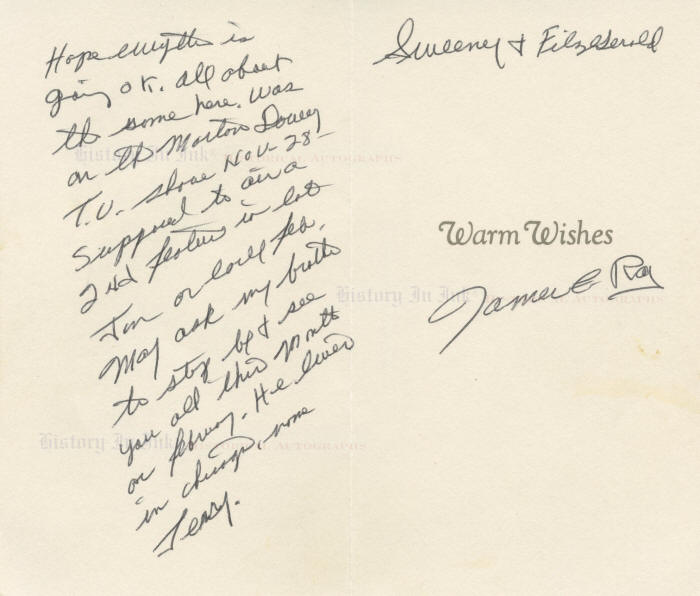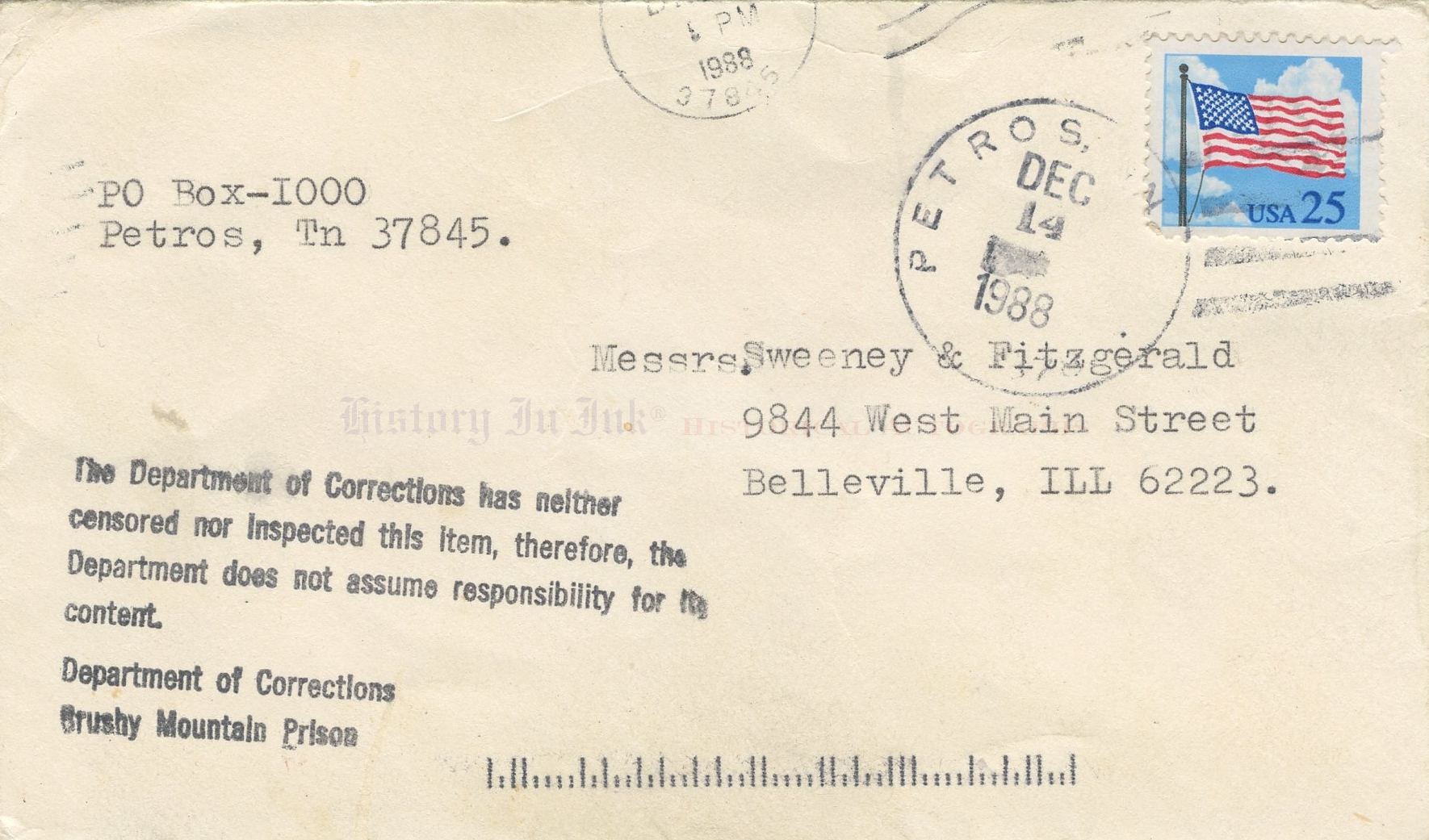


1807401
[Martin Luther King, Jr., Assassination]
James Earl Ray
“Was on the Morton Downey T.V. show Nov. 28—
supposed to air a 2nd feature in late Jan. or early Feb.”
James Earl Ray, 1928–1998. Convicted assassin of Dr. Martin Luther King, Jr. Autograph Letter Signed, James E Ray, on a 3½” x 6” Christmas card, no place [Petros, Tennessee], no date [December 14, 1988]. With original envelope.
Ray sends a Christmas card to correspondents in Belleville, Illinois, near Ray’s hometown of Alton, Illinois, with whom Ray corresponded over several years. He writes, in full: “Hope everything is going OK. All about the same here. Was on the Morton Downey T.V. show Nov. 28—supposed to air a 2nd feature in late Jan or early Feb. May ask my brother to stop by & see you all this month or February. He lives in Chicago, name Jerry.”
In an interview later aired on television, Downey asked Ray whether he thought that the government “had a conspiracy . . . to show you as the assassin of Martin Luther King.” Ray replied that there were “several things highly unusual about the case.” Downey interjected, “Did you do it?” Ray snapped back, “No. But I don’t—” Downey cut him off in mid-sentence. “If you had done it,” he asked, “would you say you did it?” Ray logically replied, “Well, I doubt very much. Usually when you go to trial, you don’t go to trial to plead guilty.”
Witnesses saw Ray fleeing from a rooming house where he had rented a room across the street from the motel after Dr. Martin Luther King, Jr., was shot on April 4, 1968, while he was standing on the second-floor balcony of the Lorraine Motel in Memphis, Tennessee. Investigators found a package that contained a Remington rifle and a pair of binoculars, both with Ray’s fingerprints on them. Using the name Harvey Lowmeyer, Ray had previously bought a Remington Model 760 Gamemaster .30-06 rifle, which he had fitted with a Redfield 2x-7x scope.
Ray fled to Canada and was eventually arrested at London’s Heathrow Airport while attempting to travel to Brussels, Belgium, on the false passport. He was extradited to the United States and charged in Tennessee with King’s assassination. He confessed, pled guilty, and received a 99-year prison sentence. Almost immediately, he recanted his confession, stating that he had pled guilty on the advice of his attorney in order to avoid the death penalty. He spent the rest of his life in prison unsuccessfully trying to withdraw his guilty plea and obtain a trial.
Ray did participate in a mock trial for British television, part of his effort to convince Tennessee authorities that he should have a real trial. The jury in the mock trial acquitted him. King’s family concluded that Ray was innocent and urged that he be given a trial.
Ray’s younger brother Jerry (1936–2016), whom he mentions in this letter, continually asserted Ray’s innocence of the King murder. In 2011, he and investigative journalist Tamara Carter published A Memoir of Injustice, which revealed information about Ray and the events of the day King was killed. It also challenged the State of Tennessee’s refusal to release Ray’s Remington rifle, which it held as evidence, for modern ballistics testing.
Indeed, in 1997, the Tennessee Court of Criminal Appeals ruled that James Earl Ray could not “examine or test physical evidence in governmental control based upon allegations that such an examination or test could establish actual innocence,” since a mere allegation that the evidence might demonstrate innocence “would open the floodgates to frivolous requests.” The Tennessee statute on which Ray based his claim, it said, was “designed for the extraordinary case when one has scientific evidence that establishes actual innocence.” Ray v. State, 984 S.W.2d 236, 237–38 (Tenn. Ct. Crim. App. 1997). The court did not explain how Ray could possibly demonstrate the existence of ballistics evidence that would prove him innocent when the State maintained control of the gun and would not let him test it. After Ray’s death, the Tennessee Court of Appeals also affirmed the probate court’s dismissal of an action by Jerry, the executor of his estate, to force the state to return the rifle and other items of Ray’s property seized for use as evidence against him. Ray v. State, No. W2002-01611-COA-R3-CV, 2003 WL 22351014 (Tenn. Ct. App. Oct. 15, 2003).
This card is in very fine condition. Ray has written the text, addressed the card at the top, and signed in bold, blue ballpoint. Only a tiny stain below, but removed from, the signature keeps the card from being in extra fine condition. The accompanying typed envelope has been opened at the top and bears a stamp from Brushy Mountain Prison and normal postal markings. It is slightly soiled, as one would expect, and is in fine condition.
Unframed.
_____________
This item has been sold, but
click here to see other
American History items
that we are offering.



